07 Oct 2020 - {{hitsCtrl.values.hits}}
Sri Lanka is home to 5 out of 8 endangered turtle species
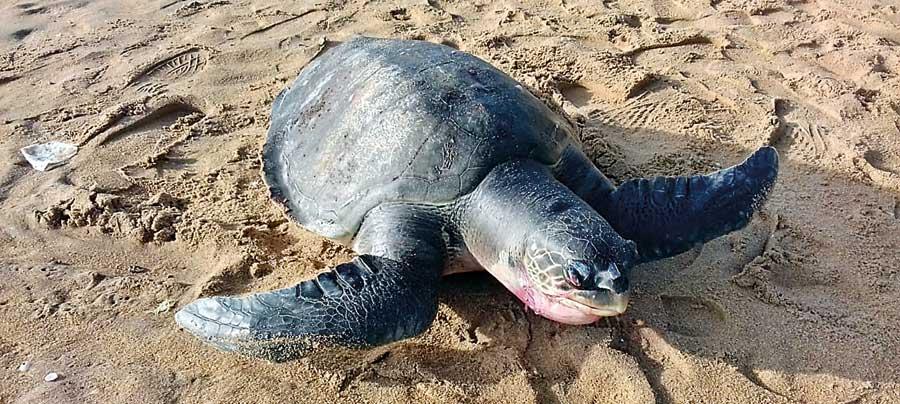
Turtle carcass washed ashore
Sri Lanka’s beautiful seas are home to an assortment off exotic marine life. With the recent oil spill off the seas of Ampara, caused by a raging fire onboard the MT New Diamond, scrutiny over the island’s precious marine  resources has increased.
resources has increased.
MT New Diamond, a 330-metre-long supertanker, carrying crude oil to India caught fire off the east coast near Ampara on September 3. Following weeks-long legal disputes and discussions, the tanker is now being towed away from Sri Lankan waters. Sri Lankan coasts were spared of what experts predicted would have been one of the greatest oil-spill disasters of the region. Yet, marine scientists have warned that damage has already been inflicted upon marine life.
Despite it being an accidental phenomenon, it raised concerns in terms of the marine damage on Sri Lankan waters and the costs that the Sri Lankan Government had to bear on dousing the fire. Almost a month since the fire onboard the tanker, signs of harmful effects on marine species seemed to emerge as several turtle carcasses, washed ashore in Colombo over the weekend. Concerns have been raised that this occurrence may be a result of the MT New Diamond oil leak, as marine species especially as the seas off Sri Lanka’s East coast are home to many exotic marine species such as whales, dolphins and turtles.
 Prior to this incident, several scientists attached to the National Aquatic Resources Research and Development Agency (NARA) observed unusual behaviour of turtles in the vicinity of the seas affected by the New Diamond. Principal Scientist at NARA Dr. Prabath Jayasinghe told Daily Mirror that an abnormal observation of these turtles was recorded on Friday.
Prior to this incident, several scientists attached to the National Aquatic Resources Research and Development Agency (NARA) observed unusual behaviour of turtles in the vicinity of the seas affected by the New Diamond. Principal Scientist at NARA Dr. Prabath Jayasinghe told Daily Mirror that an abnormal observation of these turtles was recorded on Friday.
“We took prompt steps to inform the relevant officials regarding the behavioural change of these turtles,” he said.
“Though these turtles were not found in the area where a 2 metre oil patch was observed in the seas near the ‘MT New Diamond, it is yet to be ascertained whether any impact of the oil caused this type of behaviour of turtles, Dr. Jayasinghe said. “It is rare to notice turtles during our usual inspection journeys. However, we noticed several turtles which seemed to be finding it difficult to swim downwards during a recent inspection journey, Dr. Jayasinghe added.
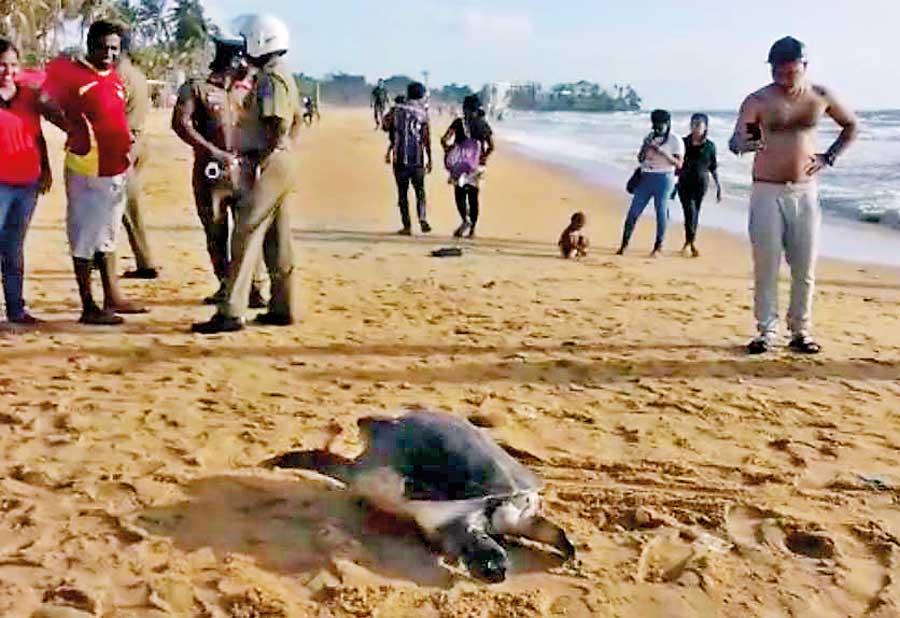
When asked whether any other marine species were found having similar behavioural changes, he said other species like whales, dolphins were seen but no abnormal behaviour was observed.
Meanwhile, the Department of Wildlife Conservation (DWC) launched an investigation to find the cause of at least ten dead turtles that washed ashore on the Colombo beaches during the weekend.
Public vigilance increased after carcasses of three turtles were found on the Mount Lavinia beach on October 3. However, on the following day (4), five more dead turtles were found washed onto the Galle Face beach while another two were found in pretty much the same condition on the Wellawatte beach.
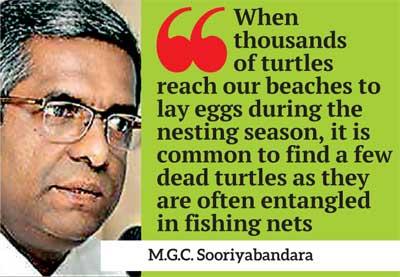 Confirming the unnatural turn of events, Director General of the Department of Wildlife Conservation M.G.C. Sooriyabandara told the Daily Mirror that a court order would be sought from the Mount Lavinia Magistrate to obtain experts’ opinions to figure out the cause of the events.
Confirming the unnatural turn of events, Director General of the Department of Wildlife Conservation M.G.C. Sooriyabandara told the Daily Mirror that a court order would be sought from the Mount Lavinia Magistrate to obtain experts’ opinions to figure out the cause of the events.
He said that when thousands of turtles reach our beaches to lay eggs during the nesting season, it is common to find a few dead turtles as they are often entangled in fishing nets. However, he reiterated that the finding of a large number of carcasses should be investigated.
What happened to the turtles?
Meanwhile the Marine Environment Protection Authority (MEPA) has requested the Wildlife Department to investigate if there was any oil inside the nostrils of the dead turtles.
MEPA Chairperson Dharshani Lahandapura told Daily Mirror that they were yet to receive the findings on the 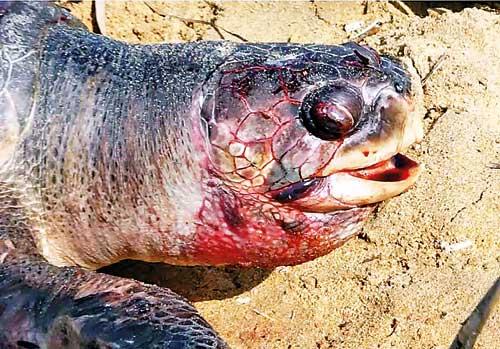 investigation and added that they were yet to ascertain whether these phenomena could be linked to the marine damage caused by the MT New Diamond. “However, there is still a possibility of marine species coming under threat due to marine damage caused by the oil tanker,” the Chairperson said.
investigation and added that they were yet to ascertain whether these phenomena could be linked to the marine damage caused by the MT New Diamond. “However, there is still a possibility of marine species coming under threat due to marine damage caused by the oil tanker,” the Chairperson said.
She underlined that the area where the vessel caught fire, had been identified as a zone where five endangered turtles species can be found. Meanwhile, the Wildlife Department said they had handed over further investigations to the Veterinary Research Institute following a court order.
Department’s Director (Health) Dr. Tharaka Prasad told Daily Mirror that they were unable to form a definite opinion on the incident. When asked about the population of turtles in Sri Lankan waters, he said the number cannot be counted; however, it can be said that out of the eight turtle species, five are found in Sri Lankan waters.
Can marine life be compensated?
The owners of crude oil tanker MT New Diamond had informed Attorney General Dappula de Livera of their agreement to settle fully the interim claim of the government’s stakeholders for Rs.340 million, the Attorney General’s Coordinating Officer State Counsel Nishara Jayaratne said on September 25. Ms. Jayaratne said the Attorney General had submitted a further claim of Rs.100 Million against the ship owners of Oil Tanker MT New Diamond.
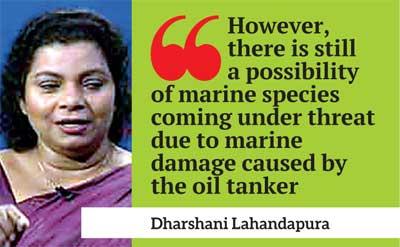 However, the Government this week said that they received Rs. 442 million from the owners of MT New Diamond. The money has been given to Sri Lanka as actual expenses incurred by the government stakeholders in controlling the fire on board. Despite the actual damage caused to marine life, the AG’s Department said the government had so far not received compensation for marine pollution caused by the vessel fire.
However, the Government this week said that they received Rs. 442 million from the owners of MT New Diamond. The money has been given to Sri Lanka as actual expenses incurred by the government stakeholders in controlling the fire on board. Despite the actual damage caused to marine life, the AG’s Department said the government had so far not received compensation for marine pollution caused by the vessel fire.
It was under such a situation that the Maritime Rescue Co-ordination Centre (MRCC) had permitted the owner of the Diamond to tow the vessel away from Sri Lankan waters on condition that the ship owner pays the relevant compensation. According to Naval Spokesman Captain Indika De Silva, the process of towing the vessel has commenced and it would take at least two months for the vessel to reach a harbour. “The company has sent a passage planning with regard to moving the vessel to a safer location. Accordingly, the MRCC has endorsed it subject to payment of compensation and costs incurred by the government agencies,” he added. He underlined that it was risky to further retain the vessel as the North-East monsoon was expected to take hold in coming weeks. “The vessel is currently in a dangerous zone,” he added.
Meanwhile, it was reported that the New Diamond will head to Khorfakkan in the United Arab Emirates and its cargo would be transferred in the UAE to another ship and sent to its client, Indian Oil Corp’s Paradip refinery. However, Captain Indika said they had not yet been informed of the destination of the vessel but said the vessel would head southward.
01 Nov 2024 32 minute ago
01 Nov 2024 56 minute ago
01 Nov 2024 1 hours ago
01 Nov 2024 2 hours ago
01 Nov 2024 3 hours ago